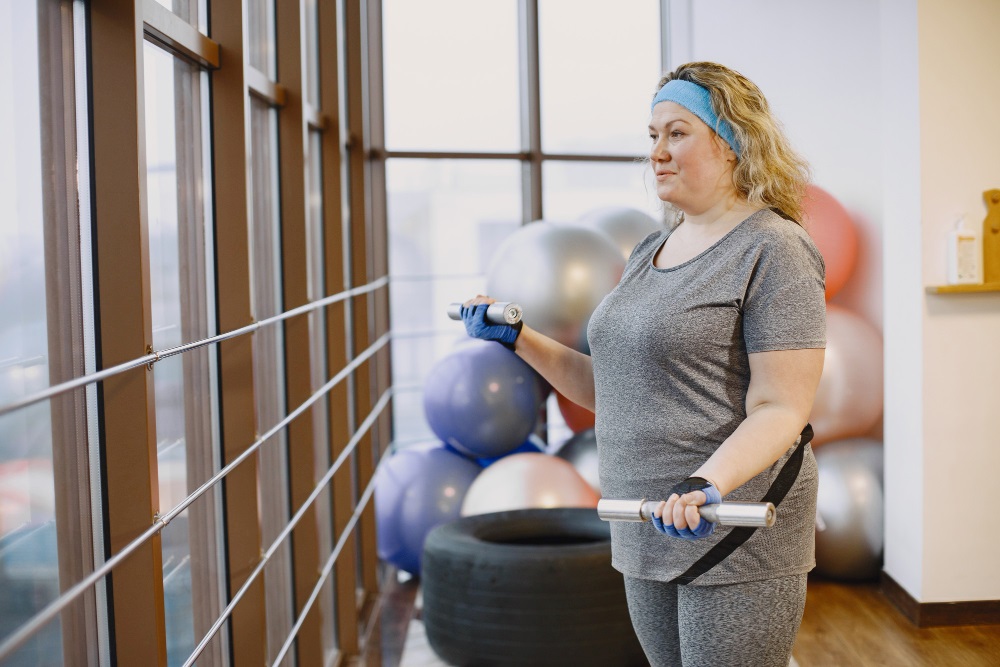No products in the cart.
Healthy
Weight Training for Women Over 50: Your Ultimate Guide to Staying Strong and Healthy
When you think of weight training, you might picture young bodybuilders or athletes lifting heavy barbells in the gym. But here’s the truth: weight training is for everyone, especially women over 50. If the idea of stepping into the weight room feels intimidating, you’re not alone. Many women worry about whether it’s too late to start or if it’s even safe. Let me assure you: not only is it safe, but it’s also one of the best things you can do for your health, vitality, and overall quality of life.
Let’s break it down so you can feel confident and inspired to embrace weight training, no matter where you are in your fitness journey.
Why Weight Training Matters for Women Over 50
As we age, our bodies go through natural changes. Muscle mass declines, bones lose density, and metabolism slows down. But here’s the good news: weight training can help counteract all of these effects.
- Preserves Muscle Mass: After the age of 30, we begin to lose muscle at a rate of about 3-8% per decade. Weight training helps you maintain and even rebuild muscle, keeping your body strong and functional.
- Improves Bone Health: Osteoporosis is a significant concern for women post-menopause. Resistance exercises stimulate bone growth, reducing the risk of fractures and falls.
- Boosts Metabolism: Building muscle increases your resting metabolic rate, meaning you burn more calories even while sitting on the couch.
- Enhances Balance and Flexibility: Strong muscles support better posture, balance, and coordination—critical for avoiding injuries as you age.
- Mental Health Benefits: Weight training is not just for the body; it’s a huge mood booster. Exercise releases endorphins that reduce stress, anxiety, and even symptoms of depression.
Debunking Common Myths About Weight Training
Let’s address a few misconceptions that might be holding you back.
- “I don’t want to get bulky.” This is a big one. Women don’t have the same testosterone levels as men, so it’s almost impossible to build bulky muscles. Instead, you’ll develop toned, lean muscles that look and feel great.
- “It’s too late for me to start.” Absolutely not! Whether you’re 50, 60, or 70, weight training can be adapted to any fitness level. Starting now can still yield significant benefits.
- “Weight training is dangerous.” When done correctly, weight training is incredibly safe. Using proper form and starting with lighter weights minimizes any risk of injury.
Getting Started: A Beginner’s Guide to Weight Training for Women Over 50
The key to success is to start slow and build gradually. Here are some practical steps:
- Consult Your Doctor: Before starting any new fitness routine, check in with your healthcare provider, especially if you have pre-existing conditions.
- Work With a Trainer: A personal trainer can help you learn proper form and create a tailored program that aligns with your goals and abilities.
- Start Light: Begin with lighter weights and focus on learning the correct movements. It’s better to master the basics than to rush into heavy lifting.
- Focus on Compound Movements: Exercises like squats, lunges, push-ups, and rows work multiple muscle groups and are incredibly effective.
- Aim for Two to Three Sessions Per Week: Consistency is key. You don’t need to spend hours in the gym; 30-45 minutes per session is enough to see results.
Simple Weight Training Routine for Beginners
Here’s a sample routine to get you started. All you need are a set of dumbbells and a chair:
- Squats (12-15 reps): Strengthen your legs and glutes. Use a chair for support if needed.
- Dumbbell Rows (12 reps per arm): Works your back and arms.
- Overhead Press (10-12 reps): Great for your shoulders and arms.
- Deadlifts (10-12 reps): Builds strength in your hamstrings, glutes, and lower back.
- Wall Push-Ups (10-15 reps): An easier variation of the classic push-up.
Repeat this circuit two or three times, resting for 1-2 minutes between rounds. Remember to listen to your body and rest when needed.
Tips to Stay Motivated
It’s easy to start strong and then lose momentum. Here’s how to stay consistent:
- Set Realistic Goals: Focus on progress, not perfection. Celebrate small victories, like increasing your weights or mastering a new exercise.
- Find a Workout Buddy: Exercising with a friend can make it more fun and hold you accountable.
- Track Your Progress: Keep a journal to log your workouts and note how you feel afterward.
- Switch It Up: Variety keeps things interesting. Incorporate new exercises or try different equipment like resistance bands or kettlebells.
Nutrition and Recovery
Weight training is only part of the equation. Proper nutrition and recovery are equally important:
- Protein is Your Friend: Protein helps repair and build muscles. Include sources like lean meat, fish, eggs, beans, or protein shakes in your diet.
- Stay Hydrated: Water supports every function in your body, including muscle recovery.
- Get Enough Sleep: Rest is when your body repairs itself, so prioritize quality sleep.
- Stretch and Warm Up: Always warm up before lifting and cool down with stretches to prevent soreness and improve flexibility.
Real-Life Inspiration
Still not convinced? Consider this: countless women over 50 have transformed their lives through weight training. From increasing energy levels to feeling more confident and capable, the benefits go beyond the physical. You don’t have to be a fitness enthusiast to get started—you just need the desire to feel better and take care of yourself.
Final Thoughts
Weight training for women over 50 isn’t just about looking good—though that’s a nice bonus! It’s about reclaiming your strength, health, and confidence. You deserve to feel vibrant and capable at every stage of life. So, take that first step. Whether it’s picking up a set of dumbbells at home or signing up for a gym membership, you’re investing in a stronger, healthier future. Remember: it’s never too late to start, and every small effort counts. You’ve got this!



